



http://digitalhumanitiesnow.org/
Related: Digital Humanities - Humanités NumériquesAssociation of College & Research Libraries This edition of Keeping Up With... was written by Jennifer L. Adams and Kevin B. Gunn. Technologies of Text – S12 I. Social Media Engagement Scholars in the field known as the “digital humanities” are, not surprisingly, active online. Many share their scholarship through blogs or social networking sites such as Twitter.
The Future of Archives in a Digital Age Scholarship and teaching in the humanities are undergoing a seismic shift, from a culture once based almost entirely on in-person and printed exchange to one reliant on a combination of traditional communications and digital technologies. It is a time of excitement for many and of skepticism for others. What does it mean that for many the most used "libraries" have become "digital"? What are the implications for the development of knowledge at a time when vast amounts of data have not been made available in digital formats?
eResearch and Digital Humanities: a broader vision? Digital Heat: Vast underground machines run by downtrodden humanists power 'Metropolis. I have been having many conversations with people of late around the boundaries of ‘eResearch’ and ‘Digital Humanities’. And I have received lots of divergent and interesting responses from both researchers and professionals working in various ways with computing in the humanities. And there does tend to be little agreement about certain aspects of the landscape; many researchers have ‘discovered’ computing in the humanities from their own particular perspective and this perspective is often lacking generosity towards the richer and deeper veins of thought and helmsmanship provided by the long history of computing in humanities research and teaching (ie. the digital humanities).
Datafication: How the Lens of Data Changes How We See Ourselves Digital media allow us to produce, collect, organise and interpret more data about our lives than ever before. Our every digital interaction contributes to vast databases of information that index our behaviour from online movie choices to mapping networks of connections across Twitter. In an age of uncertainty, big data sets promise to provide an objective lens through which to understand the world, and both individuals and institutions like schools are turning to data to drive analysis and action. But what does this increasing datafication mean for how we understand the world, and how we understand learning? Learning to Read Digital Data
The Association for Computers and the Humanities The Association for Computers and the Humanities (ACH) is a major professional society for the digital humanities. We support and disseminate research and cultivate a vibrant professional community through conferences, publications, and outreach activities. ACH is based in the US, but boasts an international membership (as of November 2015, representing 21 countries worldwide). What is DH? Digital humanities is a broad term encompassing a wide range of subject domains and communities of practice, including computer-assisted research, pedagogy, and software and content development in humanistic disciplines like literature and language studies, history, or philosophy.
Digital Writing Uprising: Third-order Thinking in the Digital Humanities “The intellectual is still only an incompletely transformed writer.” ~ Roland Barthes, Writing Degree Zero There could be many epigraphs hailing a discussion of digital writing, many pithy observations about its nature, becoming, qualities, mysteries, dilemmas. From Oscar Wilde: “A writer is someone who has taught his mind to misbehave.” Virginia Woolf: “We are nauseated by the sight of trivial personalities decomposing in the eternity of print.”
DHQ: Digital Humanities Quarterly: Spring 2011 Managing 100 Digital Humanities Projects: Digital Scholarship & Archiving in King’s Digital Lab James Smithies, King's College London; Carina Westling, King's College London; Anna-Maria Sichani, King's College London; Pam Mellen, King's College London; Arianna Ciula, King's College London Modelling Medieval Hands: Practical OCR for Caroline Minuscule Brandon W. Hawk, Rhode Island College; Antonia Karaisl, Rescribe Ltd; Nick White, Rescribe Ltd Towards 3D Scholarly Editions: The Battle of Mount Street Bridge where material book culture meets digital humanities » Wynken de Worde Below is the text from a talk I gave at the Geographies of Desire conference, held at the University of Maryland on April 27-28. Almost everything that I said there is something that I’ve said here before, so faithful readers won’t find much that’s new. But I promised I’d stick it up here, so here it is!
Graphic Sociology » Seeing Social Data Cairo, Alberto. (2013) The Functional Art: An introduction to information graphics and visualization. Berkeley: New Riders, a division of Pearson. Overview A functional art is a book in divided into four parts, but really it is easier to understand as only two parts.